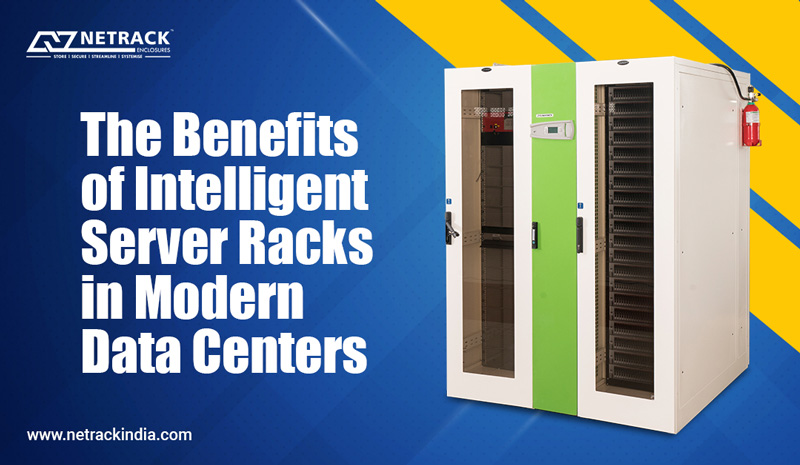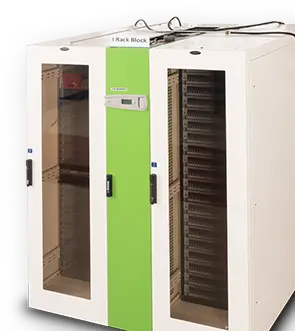Introduction
In today's fast-paced digital landscape, data centers support the ever-increasing demand for seamless connectivity, robust computing power, and secure data storage. Traditional data center infrastructures have long been the backbone of these operations. Still, as technology advances at an unprecedented pace, there is a need for more innovative solutions to address the challenges of scalability, energy efficiency, and overall performance. This is where "Intelligent Server Racks" come into the picture, ushering in a new era of data center management that brings unprecedented benefits beyond what traditional infrastructure can offer.
What are Intelligent Server Racks?Intelligent Server Racks: A Paradigm Shift in Data Center Management
Benefits of Intelligent Server Racks
Intelligent server racks bring forth a plethora of benefits that revolutionize the landscape of modern data centers. Let's delve deeper into these advantages and understand how they empower data center operators to unlock unparalleled efficiency and performance.
1. Enhanced Energy Efficiency Energy efficiency stands at the forefront of data center concerns, given the massive power requirements of running countless servers 24/7. Traditional data centers often need more efficiency due to over-provisioning resources and ineffective cooling mechanisms. Intelligent server racks, with their AI-driven capabilities, redefine energy optimization. Through real-time monitoring of server workloads and power consumption, these racks can dynamically allocate resources and adjust cooling mechanisms as per demand.
Moreover, with the ability to identify underutilized servers and consolidate workloads, intelligent server racks minimize energy wastage and ensure power is channeled where needed. The result is a substantial reduction in energy consumption, leading to significant cost savings for data center operators while contributing to a greener and more sustainable environment.
2. Improved Cooling Management Cooling is critical to data center operations, as excessive heat can lead to equipment failure and costly downtime. Traditional cooling methods often need to be more efficient and able to adapt to the dynamic heat generation within a data center. In contrast, intelligent server racks actively address cooling challenges. Equipped with advanced thermal sensors and AI algorithms, these racks continuously monitor temperature fluctuations across the data center. By analyzing this real-time data, they can precisely direct airflow and adjust cooling mechanisms to maintain an optimal server temperature. As a result, the risk of overheating is significantly reduced, prolonging the lifespan of hardware and ensuring the consistent performance of mission-critical applications.
3. Predictive Maintenance and Reduced downtime Unplanned downtime can be a nightmare for data center operators, leading to lost revenue and a damaged reputation. Traditional data centers often resort to reactive maintenance practices, addressing issues only after they occur. Intelligent server racks excel in predictive maintenance, a proactive approach that anticipates potential issues before they escalate into critical problems. By constantly monitoring servers' health and performance metrics, these racks can identify early warning signs of hardware degradation or anomalies. AI algorithms analyze this data to predict when maintenance is required, enabling data center operators to schedule maintenance during low-demand periods, minimizing downtime and maximizing the availability of services.
4. Dynamic Resource Allocation In the face of rapidly changing workloads and fluctuating demands, the ability to allocate resources dynamically becomes a game-changer. Traditional data centers often need help with static resource allocation, leading to inefficient utilization and suboptimal performance during peak times. Intelligent server racks excel in dynamic resource allocation, ensuring each server receives the computing power and storage it needs to perform at its best. AI-driven racks can intelligently distribute resources in real time by continuously monitoring workload patterns and demands. This agility enables data centers to handle fluctuations in demand more effectively, providing seamless services even during the busiest periods.

5. Optimized Space Utilization Efficiently utilizing physical space is a critical concern for data centers, particularly in urban environments with limited and costly space. Due to poor space management, traditional data centers may need help scaling up or accommodating new equipment. Intelligent server racks offer a solution to this pressing issue by optimizing space utilization. With their advanced monitoring capabilities, these racks can identify underutilized areas and consolidate workloads, making the most of the available space. As a result, data centers can free up valuable square footage for future expansion or repurposing, leading to better scalability and operational flexibility.
6. Enhanced Security and Threat Detection Considering the ever-increasing threat landscape, security remains a top priority for any data center operator. Traditional security measures, while essential, may need to be revised to combat sophisticated cyber threats effectively. Intelligent server racks provide an additional layer of security through integrated features such as biometric access control, video surveillance, and AI-driven threat detection systems. These racks can actively monitor network traffic and user behaviour for any suspicious patterns, quickly identifying potential cyber threats. With immediate detection and response capabilities, data center operators can take swift action to safeguard critical data and infrastructure from evolving cyber risks.
7. Streamlined Management and Automation
The efficiency and productivity of data center operations greatly benefit from streamlined management and automation. Traditional data centers often rely heavily on manual interventions, which can be time-consuming, error-prone, and costly in terms of human resources.
With their advanced AI capabilities, intelligent server racks introduce automation into various aspects of data center management. Routine tasks, such as server provisioning, load balancing, and network configuration, can be handled autonomously by the racks. This reduces the workload on IT staff and minimizes the risk of human errors that may lead to system failures. As a result, data center operators can focus on strategic decision-making and value-added tasks, leading to increased efficiency and overall operational excellence.
Conclusion
The advent of intelligent server racks marks a paradigm shift in modern data center management. By harnessing the power of AI, IoT, and advanced data analytics, these racks empower data center operators to optimize energy efficiency, cooling management, and resource allocation. Additionally, predictive maintenance capabilities reduce downtime and improve the reliability of data center operations. With enhanced security features and streamlined automation, intelligent server racks provide unparalleled benefits that traditional infrastructure cannot match.
As data centers evolve, embracing intelligent server racks is no longer just a competitive advantage; thriving in the digital age is necessary. The benefits they bring, from cost savings and environmental responsibility to seamless performance and enhanced security, make them an indispensable asset for any data center seeking to stay at the forefront of innovation and efficiency.
